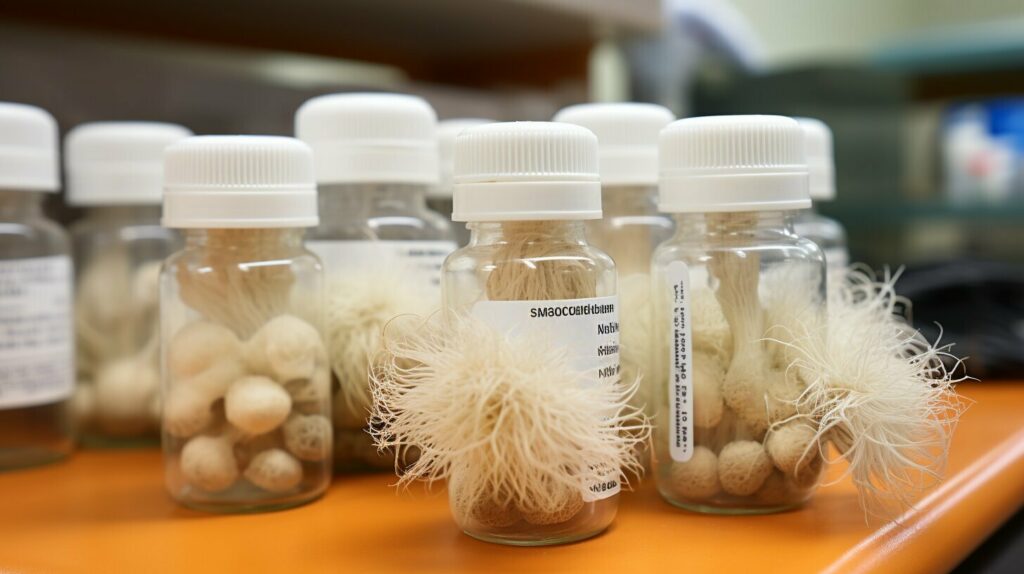Lion’s mane mushrooms may interact with certain medications, and it is important to understand the potential risks and precautions. These mushrooms, known for their cognitive and nerve regeneration benefits, have gained popularity as a natural supplement. However, before incorporating lion’s mane into your medication regimen, it is crucial to be aware of the potential interactions it may have with different medications.
- Lion’s mane mushroom gummies can interfere with blood-thinning medications, increasing the risk of bleeding
- They may also interact with antidiabetic medications, causing dangerously low blood sugar levels
- Lion’s mane mushrooms have the potential to enhance the effects of antidepressant and anti-anxiety medications
- Individuals taking blood pressure medications should use caution, as lion’s mane may lower blood pressure too much
- People with mushroom allergies, low blood pressure, autoimmune disorders, pregnant or breastfeeding individuals, and those waiting for surgery should exercise caution or avoid lion’s mane mushrooms
It is essential to consult with a healthcare professional before incorporating lion’s mane mushrooms into your routine. They can provide guidance on potential interactions and help assess any risks. Starting with a low dose and monitoring for side effects is recommended.
Lastly, it is crucial to disclose all medications and supplements to your healthcare provider to ensure optimal healthcare management and prevent any potential risks. Open communication is key to maintaining your well-being.
Potential Interactions with Blood-Thinning Medications
Table of Contents
Lion’s mane mushrooms have the potential to interact with blood-thinning medications, which can increase the risk of bleeding. These medications, also known as anticoagulants, are commonly prescribed to individuals with conditions such as deep vein thrombosis, atrial fibrillation, or heart valve replacements, to prevent the formation of blood clots.
It is important to exercise caution when considering the use of lion’s mane mushrooms alongside blood-thinning medications. The mushrooms contain compounds that may inhibit platelet aggregation, similar to the effects of these medications. When combined, this potentiation can lead to an increased bleeding risk.
Consultation with a healthcare professional is crucial to assess the potential risks and benefits of incorporating lion’s mane mushrooms into a medication regimen. Your healthcare provider can provide personalized advice and guidance based on your specific medical history and current medications. They will help determine if it is safe to use lion’s mane mushrooms alongside blood-thinning medications or if alternative options should be explored.
Potential Interactions with Blood-Thinning Medications Table
| Medication Name | Potential Interaction with Lion’s Mane Mushrooms |
|---|---|
| Warfarin | Lion’s mane mushrooms may increase the risk of bleeding when used with warfarin. |
| Dabigatran | Lion’s mane mushrooms may potentiate the anticoagulant effects of dabigatran, increasing the risk of bleeding. |
| Rivaroxaban | Combining rivaroxaban with lion’s mane mushrooms may lead to an increased bleeding risk. |

It is essential to prioritize your safety and well-being when considering the use of lion’s mane mushrooms alongside blood-thinning medications. Always consult with your healthcare provider before making any changes to your medication regimen or introducing new supplements.
Interactions with Antidiabetic Medications
If you are taking antidiabetic medications, it is crucial to be aware of how lion’s mane mushrooms could potentially lower your blood sugar to dangerous levels. Lion’s mane mushrooms have shown promising effects in reducing blood sugar levels, but when combined with antidiabetic medications, this can lead to hypoglycemia. Hypoglycemia occurs when blood sugar drops too low and can cause symptoms such as dizziness, confusion, and even loss of consciousness.

To avoid any adverse effects, it is essential to consult with your healthcare professional before incorporating lion’s mane supplements into your medication regimen. They will evaluate your specific situation and provide guidance on dosage adjustments or potential alternatives. It is crucial to monitor your blood sugar levels closely and report any significant changes or concerns to your healthcare provider.
Moreover, always disclose all medications and supplements you are taking to your healthcare provider to ensure they have a comprehensive understanding of your health management. This transparency enables them to make informed decisions and tailor your treatment plan accordingly. Lion’s mane mushrooms may have potential benefits, but it is essential to approach their use cautiously, particularly when combined with antidiabetic medications.
| Key Takeaways: |
|---|
| 1. Lion’s mane mushrooms may lower blood sugar levels and can potentially interact with antidiabetic medications. |
| 2. Consult with your healthcare professional before using lion’s mane supplements if you are taking antidiabetic medications. |
| 3. Monitor your blood sugar levels closely and report any significant changes or concerns to your healthcare provider. |
| 4. Always disclose all medications and supplements to your healthcare provider to ensure comprehensive care. |
Enhancing Effects of Antidepressant and Anti-Anxiety Medications
Combining lion’s mane mushrooms with antidepressant or anti-anxiety medications may result in enhanced effects, and it is essential to be aware of any changes in mood or anxiety levels. Lion’s mane mushrooms have shown potential in supporting cognitive function and nerve regeneration, which may complement the effects of these medications. However, it is crucial to approach this combination with caution and under the guidance of a healthcare professional.
According to research, lion’s mane mushrooms contain compounds that can stimulate the production of nerve growth factors in the brain. This action may enhance the effects of antidepressant medications, which work by regulating neurotransmitters associated with mood and emotions.
Additionally, lion’s mane mushrooms have been reported to possess anxiolytic properties, potentially amplifying the effects of anti-anxiety medications.
While the combination of lion’s mane mushrooms and antidepressant or anti-anxiety medications may be beneficial for some individuals, it is essential to monitor any changes in mood or anxiety levels closely.
Any significant alterations should be reported to a healthcare professional for proper assessment and adjustment of medication dosages if necessary.
| Summary: | Combining lion’s mane mushrooms with antidepressant or anti-anxiety medications may enhance their effects. However, monitoring changes in mood or anxiety levels is crucial, and healthcare professional guidance is advised. |
|---|
Additional Precautions
- Maintaining open communication with a healthcare professional is important to ensure optimal management of mental health conditions.
- Lion’s mane mushrooms should not be used as a replacement for prescribed medications but rather as a potential complementary approach under medical supervision.
- Individuals should follow the recommended dosage and gradually increase it, as tolerated, while monitoring for any adverse reactions.
Remember, always consult with a healthcare professional before incorporating lion’s mane mushrooms or any other supplements into your medication regimen. They can provide personalized advice based on your specific needs and circumstances.
Caution for Individuals Taking Blood Pressure Medications
If you are taking blood pressure medications, it is important to exercise caution when considering lion’s mane mushrooms due to their potential to lower blood pressure. Lion’s mane mushrooms have been found to have a hypotensive effect, meaning that they may decrease blood pressure levels. While this can be beneficial for individuals with high blood pressure, it can pose a risk for those already taking blood pressure medications.
Consulting with a healthcare professional is crucial to determine whether incorporating lion’s mane mushrooms into your regimen is safe. They can provide guidance on how to monitor your blood pressure and adjust your medications accordingly. It is essential to maintain optimal blood pressure levels to ensure your overall health and well-being.
| Cautionary Measures for Individuals Taking Blood Pressure Medications: |
|---|
| 1. Consult with your healthcare professional before introducing lion’s mane mushrooms into your routine. |
| 2. Monitor your blood pressure regularly and report any significant changes to your healthcare provider. |
| 3. Adjust your dosage of blood pressure medications as advised by your healthcare professional. |
| 4. Be aware of any potential symptoms of low blood pressure, such as dizziness or lightheadedness. |
By following these precautions and working closely with your healthcare professional, you can ensure the safe integration of lion’s mane mushrooms into your medication regimen. Remember, the goal is to achieve a balanced and optimal blood pressure level that supports your overall health and well-being.
Expert Quote:
“Individuals taking blood pressure medications should exercise caution when considering lion’s mane mushrooms. The potential hypotensive effect of lion’s mane mushrooms can interact with these medications, leading to a significant drop in blood pressure. It is crucial for patients to consult with their healthcare professional to assess the risks and benefits and make appropriate adjustments in their medication regimen.”

Precautions for Allergies, Autoimmune Disorders, Pregnancy, Breastfeeding, and Surgery
Individuals with allergies, autoimmune disorders, those who are pregnant or breastfeeding, and individuals awaiting surgery should exercise caution or avoid lion’s mane mushrooms altogether due to potential risks. Lion’s mane mushrooms may trigger allergic reactions in individuals who are sensitive to mushrooms or have a history of mushroom allergies. It is important to note that even individuals without prior mushroom allergies may develop an allergic response to lion’s mane mushrooms.
| Precautions | Reason |
|---|---|
| Avoidance during Pregnancy | Lion’s mane mushrooms may stimulate uterine contractions and potentially lead to complications during pregnancy. It is advisable for pregnant individuals to refrain from consuming lion’s mane mushrooms until further research provides a clearer understanding of their effects. |
| Exercise Caution while Breastfeeding | There is limited research on the safety of consuming lion’s mane mushrooms while breastfeeding. It is recommended that breastfeeding individuals consult with their healthcare providers before incorporating lion’s mane mushrooms into their diet to assess any potential risks. |
| Avoidance before Surgery | Lion’s mane mushrooms may affect blood clotting and increase the risk of bleeding during and after surgery. It is crucial for individuals awaiting surgery to refrain from consuming lion’s mane mushrooms for a significant period before their scheduled procedure. It is essential to follow the advice of healthcare professionals regarding the discontinuation of lion’s mane mushrooms. |
In addition to these precautions, individuals with autoimmune disorders, such as multiple sclerosis or rheumatoid arthritis, should approach lion’s mane mushrooms with caution. Limited research exists on their interaction with autoimmune conditions. It is advisable to consult with a healthcare professional to evaluate potential risks and benefits.
“As with any supplement or medication, it is crucial to consider individual health conditions and consult with a healthcare professional before incorporating lion’s mane mushrooms. Taking the necessary precautions will ensure the safety and well-being of individuals.”

To summarize, individuals with allergies, autoimmune disorders, those who are pregnant or breastfeeding, and individuals awaiting surgery should exercise caution or avoid lion’s mane mushrooms altogether due to potential risks. It is important to consult with a healthcare professional before taking lion’s mane mushrooms to assess any potential interactions or risks. Starting with a low dose and monitoring for side effects is recommended, and all medications and supplements should be disclosed to healthcare providers.
Consultation with Healthcare Professionals for Medication Interactions
Before starting lion’s mane mushroom supplements, it is crucial to consult with a healthcare professional to assess any potential interactions or risks with your current medication regimen. Lion’s mane mushrooms, known for their potential cognitive and nerve regeneration benefits, may interact with certain medications, leading to undesirable effects. Taking this step is essential to ensure your safety and optimize your overall health.
During your consultation, be sure to provide a comprehensive list of all the medications you are currently taking, including over-the-counter drugs and supplements. This information will help your healthcare professional evaluate the potential for any interactions between your medications and lion’s mane mushrooms. They can determine if any adjustments to your dosage or medication regimen are needed.
It’s important to note that lion’s mane mushrooms may interfere with blood-thinning medications, such as aspirin or warfarin, which can increase the risk of bleeding. Similarly, individuals taking antidiabetic medications should exercise caution, as lion’s mane mushrooms may cause dangerously low blood sugar levels. By discussing your specific medication regimen with your healthcare professional, you can better understand any potential risks and make an informed decision.
| Medication Interactions | Precautions |
|---|---|
| Blood-Thinning Medications | Increased risk of bleeding |
| Antidiabetic Medications | Dangerously low blood sugar levels |
| Antidepressant and Anti-Anxiety Medications | Enhanced effects |
| Blood Pressure Medications | Potential lowering of blood pressure |
| Allergies, Autoimmune Disorders, Pregnancy, Breastfeeding, and Surgery | Exercise caution or avoid use |
By working closely with your healthcare professional, you can navigate the potential interactions between lion’s mane mushrooms and your medications effectively. They can provide personalized guidance based on your individual circumstances, ensuring that you make informed decisions about integrating lion’s mane supplements into your healthcare routine.
Starting with a Low Dose and Monitoring for Side Effects
To ensure safety, it is advisable to start with a low dose of lion’s mane mushrooms and closely monitor for any potential side effects. Lion’s mane mushrooms have gained popularity for their cognitive and nerve regeneration benefits. However, like any supplement, it is important to exercise caution and gradually increase the dosage.
By starting with a low dose, individuals can assess how their body reacts to lion’s mane mushrooms and determine the appropriate dosage for their needs. This approach allows for better control and minimizes the risk of any adverse reactions.
Monitoring for side effects is equally important. While lion’s mane mushrooms are generally well-tolerated, some individuals may experience mild digestive discomfort or allergic reactions. By paying attention to any changes in their physical well-being, individuals can identify and address any potential side effects promptly.

Remember, it is always recommended to consult with a healthcare professional before incorporating any new supplement into your routine. They can provide personalized guidance based on your specific health needs and any medications you may be taking.
Table: Potential Side Effects of Lion’s Mane Mushrooms
| Common Side Effects | Rare Side Effects |
|---|---|
|
|
Importance of Disclosure to Healthcare Providers
To ensure comprehensive healthcare management, it is vital to disclose the use of lion’s mane mushrooms and other supplements to your healthcare providers. Lion’s mane mushrooms have gained popularity for their potential cognitive and nerve regeneration benefits. However, they can interact with certain medications and pose risks to individuals with specific health conditions.
When discussing your medication regimen with your healthcare providers, it is important to mention if you are using lion’s mane mushrooms or any other supplements. This information allows them to assess any potential interactions or risks that may arise from combining these substances with your prescribed medications.
By disclosing the use of lion’s mane mushrooms, your healthcare providers can make informed decisions about your treatment plan. They can provide guidance on the appropriate dosage, monitor for any side effects, and make adjustments to your medication regimen if necessary. This open communication ensures that your healthcare management aligns with your specific needs and goals.
Remember, your healthcare providers are there to support you and provide the best possible care. By being transparent about your use of lion’s mane mushrooms and other supplements, you empower them to tailor your treatment plan and safeguard your well-being.

| Potential Interactions | Risks | Precautions |
|---|---|---|
| Interference with blood-thinning medications | Increased risk of bleeding | Consult with healthcare professional |
| Interaction with antidiabetic medications | Dangerously low blood sugar levels | Exercise caution, seek medical advice |
| Enhancement of effects of antidepressant and anti-anxiety medications | Potential mood and anxiety level changes | Monitor for any adverse reactions |
| Potential lowering of blood pressure | Risk of excessively low blood pressure | Use with caution, consult with healthcare professional |
| Precautions for individuals with allergies, autoimmune disorders, pregnancy, breastfeeding, and surgery | Potential risks and complications | Exercise caution or avoid use |
Conclusion
Lion’s mane mushrooms have the potential to interact with certain medications, and individuals should exercise caution, consult with healthcare professionals, and disclose all medications and supplements for safe use.
These unique mushrooms, renowned for their cognitive and nerve regeneration benefits, may pose risks when combined with certain medications. For individuals taking blood-thinning medications, lion’s mane mushrooms may interfere with their effectiveness, potentially increasing the risk of bleeding.
Similarly, if you are taking antidiabetic medications, it is crucial to be aware that lion’s mane mushrooms may cause dangerously low blood sugar levels. Close monitoring and medical advice are essential for those with diabetes.
In addition to these interactions, lion’s mane mushrooms have the potential to enhance the effects of antidepressant and anti-anxiety medications. This highlights the importance of paying attention to any changes in mood or anxiety levels when using these substances together.
If you are on blood pressure medications, it is advisable to exercise caution when considering lion’s mane mushrooms, as they may lower blood pressure too much. Consulting with a healthcare professional can help ensure optimal blood pressure management.
Furthermore, individuals with allergies to mushrooms, low blood pressure, autoimmune disorders, those who are pregnant or breastfeeding, or awaiting surgery should exercise caution or avoid lion’s mane mushrooms altogether.
Prior to incorporating lion’s mane mushrooms into your regimen, it is vital to consult with a healthcare professional. They can assess potential interactions and risks based on your specific medical history and medications. Starting with a low dose and closely monitoring for any side effects is also recommended.
Remember, open and honest communication with healthcare providers is essential. Disclosing the use of lion’s mane mushrooms and other supplements will ensure they have all the necessary information to provide you with the best possible care and prevent any potential risks.
FAQ
Q: Does Lion’s Mane Interact with Medications?
A: Yes, lion’s mane mushrooms may interact with certain medications. It is important to be aware of these potential interactions to ensure safe and effective use.
Q: What medications can lion’s mane mushrooms interfere with?
A: Lion’s mane mushrooms can interfere with blood-thinning medications, antidiabetic medications, antidepressant and anti-anxiety medications, and blood pressure medications.
Q: How can lion’s mane mushrooms interact with blood-thinning medications?
A: Lion’s mane mushrooms may interfere with blood-thinning medications, potentially increasing the risk of bleeding. It is important to consult with a healthcare professional before combining these substances.
Q: What are the potential interactions between lion’s mane mushrooms and antidiabetic medications?
A: Lion’s mane mushrooms may interact with antidiabetic medications, causing blood sugar levels to drop dangerously low. Individuals with diabetes should exercise caution and seek medical advice.
Q: Can lion’s mane enhance the effects of antidepressant and anti-anxiety medications?
A: Yes, lion’s mane mushrooms may enhance the effects of antidepressant and anti-anxiety medications. It is important to monitor any changes in mood or anxiety levels and consult with a healthcare professional.
Q: Should individuals taking blood pressure medications use caution with lion’s mane mushrooms?
A: Yes, lion’s mane mushrooms may lower blood pressure too much. Individuals taking blood pressure medications should use caution and consult with a healthcare professional for proper blood pressure management.
Q: Who should exercise caution or avoid lion’s mane mushrooms altogether?
A: Individuals with mushroom allergies, low blood pressure, autoimmune disorders, those who are pregnant or breastfeeding, and individuals waiting for surgery should exercise caution or avoid lion’s mane mushrooms altogether.
Q: Why is it important to consult with a healthcare professional before taking lion’s mane mushrooms?
A: It is important to consult with a healthcare professional to assess any potential interactions or risks, especially if you are taking medications. Healthcare professionals can provide personalized guidance and help prevent any adverse effects.
Q: Should I start with a low dose of lion’s mane mushrooms?
A: Yes, it is recommended to start with a low dose of lion’s mane mushrooms and gradually increase the dosage. This allows you to monitor for any potential side effects and adjust accordingly.
Q: Why is it important to disclose all medications and supplements to healthcare providers?
A: Proper disclosure of all medications and supplements, including lion’s mane mushrooms, is crucial for healthcare providers to ensure optimal healthcare management. It helps prevent potential interactions or risks and allows for informed decision-making.







